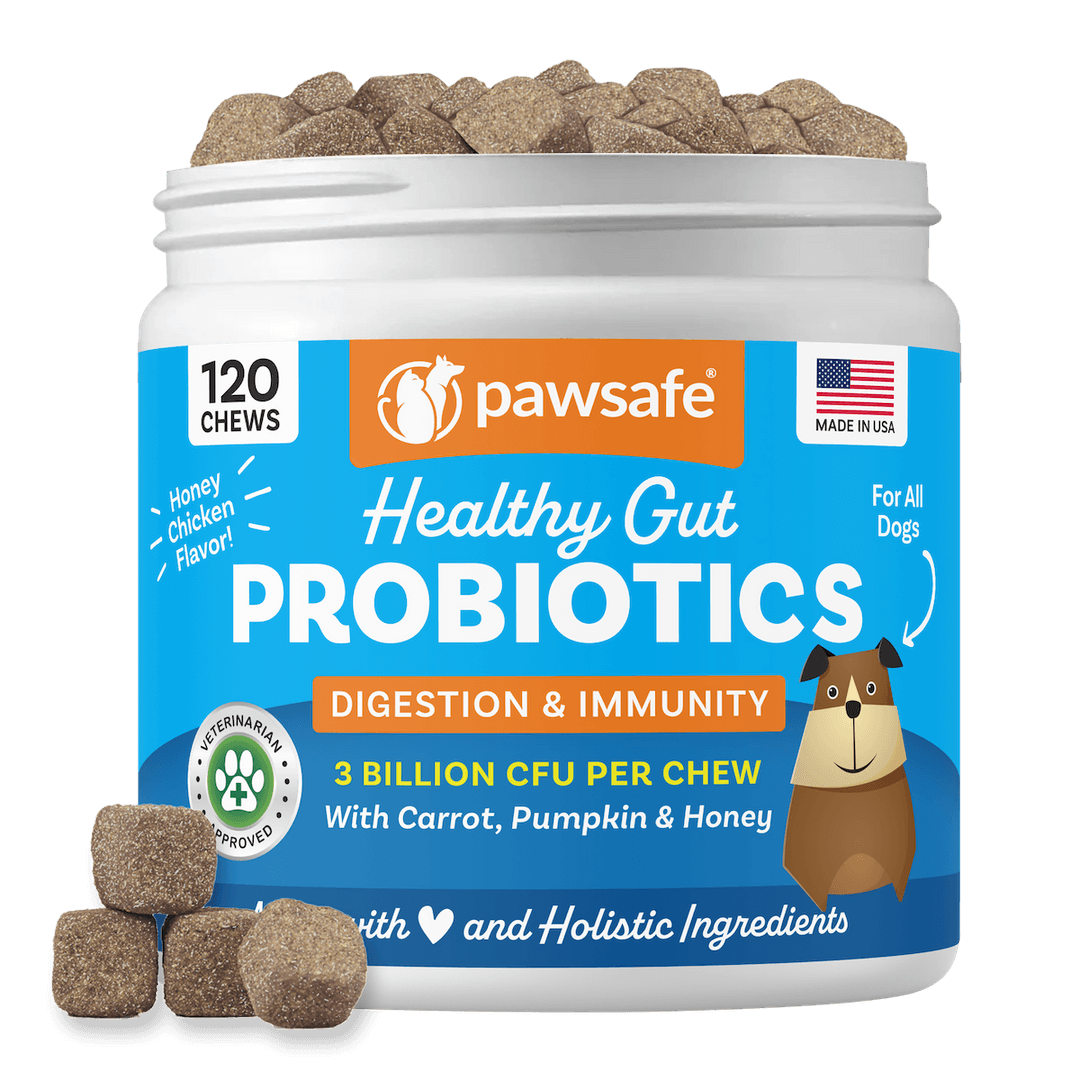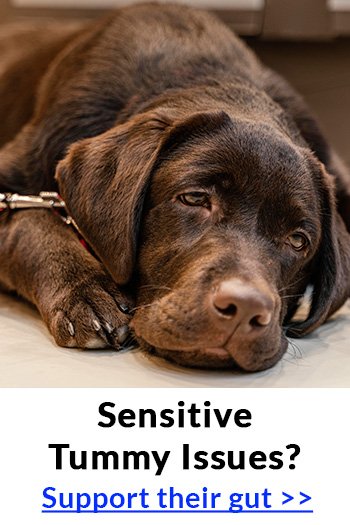
If you’re a dog owner, you’ve likely wondered, “why is my dog’s poop soft?” A dog’s stool can be an indicator of their overall health, making it essential to pay attention to its consistency, color, and odor.
One of the most common issues dog owners face is soft poop. While it’s not always a cause for concern, it’s essential to understand why your dog’s poop is soft and how to address it. Luckily, there’s a lot of stuff you can do to help, like promoting a healthy gut environment with probiotics.
Sources like What’s Wrong With My Dog[1] all seem to agree that soft poop is common and mostly diet related. Read along to discover why your puppy’s poop is too soft, and whether it means something is seriously wrong.
Table of Contents
So, Why is My Dog’s Poop Soft But Not Diarrhea?
There are several reasons why your dog’s poop may be soft, including food intolerances, dietary changes, allergies, bacterial or viral infections, inflammation in the gut such as with IBD or colitis, parasites, stress, and malabsorption or other gastrointestinal issues.
It’s crucial to determine the underlying cause to address the issue adequately.
Key Takeaways
- Soft dog poop can be caused by various factors, including dietary issues and underlying health problems.
- Treating soft dog poop may involve a simple diet change or adding fiber to their diet. However, consulting a veterinarian is crucial if the issue persists or is accompanied by other symptoms.
- Preventing soft dog poop involves monitoring their diet, providing plenty of exercises, and seeking prompt veterinary care for any health issues.
Tip: if you notice a lot of slime on your dog’s soft stool, or if the poop is red or contains blood, see our article on bloody poop to know if it may be serious. If the poop is not just soft, but watery, see our article on liquid dog poop.
10 Common Causes of Soft Dog Poop

If you’ve noticed that your dog’s poop is softer than usual, there could be a few different reasons why. Unlike more severe stool issues such as bloody poop, soft stools are actually quite common, and most go away by themselves, so long as there are no other serious symptoms to worry about such as fever, vomiting, or refusing to eat.
However, it’s essential to know the exact cause of the change before deciding on the severity. In this section, we’ll go over some of the most common causes of soft dog poop, including diet, health issues, and stress.
1. Diet Intolerances
One of the most common causes of soft dog poop is diet. This could be the culprit if you’ve recently changed your dog’s food too fast or if they’ve been eating too many treats or table scraps.** A diet high in fat or lacking fiber[2]** can also lead to soft stools.**
It’s important to ensure your dog gets a balanced diet with the right amount of nutrients and fiber. Diet intolerances and stomach sensitivity not only cause diarrhea, but are also responsible for other changes like yellow poop.
Dogs can eat a lot of things that may upset their tummies, so check out our articles on how to stop a dog eating poop and why dogs eat rocks.
2. Food Allergies
Allergies can cause digestive upset in dogs, leading to increased bowel movements. Common culprits include certain protein sources like chicken and beef, grains including wheat and corn or artificial additives.
Consult with your veterinarian to determine if your dog might have a food intolerance or allergy and to identify appropriate dietary changes.
Note: Allergies and food intolerances are vastly different. Intolerance is reactions to foods or ingredients your dog can’t properly digest, like lactose, spices, and additives like CMC. However, allergies are immune responses when the body reacts adversely to something otherwise harmless.
3. Stress
Stress can also cause soft dog poop. If your dog is experiencing stress or anxiety, it can affect their digestive system and lead to diarrhea or loose stools. Changes in routine, travel, or other disruptions to your dog’s regular routine can all cause stress.
It’s essential to try to minimize stress as much as possible and provide your dog with a calm and stable environment. Stress softens the poop, and the bowel movements resulting from the condition could make your dog poop too much.
4. Intestinal parasites
Intestinal parasites like worms (roundworms, hookworms, tapeworms) or protozoa (giardia, coccidia) can infest your dog’s intestines. This causes digestive disturbances, resulting in soft or loose stool.
The soft poop will almost always have white, moving spots, which are the worms leaving your dog’s body when still alive. The dog will also have a dull coat, an inability to gain weight, and sometimes a distended abdomen.

Daily Support For Healthy Digestion
Multi-strain probiotic soft chews that help maintain gut balance and stool quality in an easy, tasty format.
Shop Now 👉Vet Approved Formula • 90-Day PawSafe® Promise
5. Viral and Bacterial Infections
Inflammation of the gastrointestinal tract due to bacterial or viral infections can lead to diarrhea, vomiting, and soft stool. These infections mostly cause diarrhea, but your dog can also experience unusually soft stools.
Parvovirus, a highly contagious viral infection primarily affecting puppies, causes severe gastrointestinal symptoms, including bloody diarrhea and soft stool. But dogs, especially puppies can also get infections in their gut that cause inflammation, like colitis.
6. Certain Medications and Supplements
Certain medications or supplements can have gastrointestinal side effects, including increased bowel movements. Laxatives[3] are the most common supplements that can increase stool frequency. Nearly all medications have a soft stool and increased pooping as a side effect.
If your dog has recently started a new medication or supplement, check with your veterinarian to determine if it could contribute to the increased pooping. They may suggest adjusting the dosage or switching to an alternative option.
7. Inflammatory Bowel Disease (IBD) – Intestinal Issues
Inflammatory bowel disease is a chronic condition characterized by inflammation of the gastrointestinal tract. Dogs with IBD may experience symptoms such as frequent bowel movements, diarrhea, and weight loss.
Diagnosis and management of IBD require veterinary intervention, so consult with your veterinarian for an accurate diagnosis and treatment plan. Other intestinal issues that can cause excessive pooping in dogs include Colitis, Irritable bowel syndrome (IBS), and Crohn’s Disease.
8. Pancreatic and Liver Issues
Pancreatic insufficiency[4] occurs when the pancreas fails to produce sufficient digestive enzymes. This condition can lead to poor digestion and frequent, loose stools. Liver issues also cause soft stool or diarrhea that’s oddly colored, for instance yellow or green poop.
9. Tumors Along the GI Tract
In rare cases, tumors or polyps in the gastrointestinal tract can cause increased bowel movements. These growths can disrupt normal digestive function and result in frequent defecation.
The tumors can be cancerous or non-cancerous, but both need medical examination. lymphoma, adenocarcinoma, and leiomyosarcoma are the most common intestinal cancer types that can affect canines.
10. Large Breed Dogs Struggle More with Digestion
Something that is often overlooked is that larger dogs have a shorter length of intestine than smaller dogs, and so they often struggle with soft stools from digestive issues. According to studies[5], larger dogs need more insoluble fiber(such as from cellulose) in their diet than soluble fiber, which can make their stool more watery.
They also need highly digestible proteins and carbohydrates that can break down quickly in the gut before they reach the hindgut and ferment, causing softer watery stools that are common in large dogs like German Shepherds.
Why Does My Dog Have Soft Poop But Is Acting Fine?

Soft poop but normal behavior could indicate a mild digestive upset or dietary issue. Soft poop can be caused by factors such as a change in diet, eating something unusual, or a mild gastrointestinal infection. However, soft poop is very common in young puppies as they are very susceptible to tummy upsets. Most of the time it’s not too serious (but aware of something like parvo poop).
However, since your dog is acting fine and not displaying any other concerning symptoms such as lethargy, loss of appetite, or vomiting, it’s likely that the issue is temporary and not severe.
How to Firm Up My Dog’s Poop
If your dog is experiencing soft poop, you may be wondering what you can do to help them. Luckily, several home remedies and medications can help treat this issue.

Gut & Immune Support In One Chew
Targeted strains assist normal digestion while supporting natural immune defenses—simple once-a-day routine.
Shop Now 👉Vet Approved Formula • 90-Day PawSafe® Promise
Home Remedies
One home remedy you can try is feeding your dog a bland diet. This can include cooked chicken and rice. Make sure to transition your dog to this diet slowly to avoid upsetting their stomach.
Additionally, probiotics can help regulate your dog’s digestive system and improve stool consistency. They do this by improving the intestinal environment when they promote a healthy mix of good and bad bacteria. Consider adding quality probiotics to support your dog’s digestive health.
Natural ingredients like fiber can also help firm up your dog’s stool. When adding fiber to your dog’s diet remember to distinguish between soluble and insoluble sources. Soluble fiber[6] sources like psyllium, oats, apples, carrots, and peas firm up stool to reduce diarrhea. But insoluble fiber is better for large dog breeds as it adds bulk and does not absorb water. This means the stool is less watery.
However, insoluble fiber sources like whole grains, whole bran, broccoli, celery, and cabbage help with constipation. This means that feeding too much insoluble fiber to your dog with lose stool can actually make the constituency worse because they work by reducing transit time.
Medication
If an underlying health issue causes your dog’s soft poop, medication may be necessary. Your vet may prescribe medication to treat worms, parasites, or other health problems causing soft stools. If your dog is experiencing diarrhea, medication to control the volume and odor of their stools may also be necessary.
It’s important to note that if your dog’s soft poop is accompanied by other symptoms such as lethargy, bleeding, or a change in appetite, you should take them to the vet immediately. These symptoms could be a sign of a more serious health issue such as cancer or liver disease.,
How to Prevent Soft Dog Poop in the Future
1. Ensure a Healthy Diet
Your dog’s diet significantly affects their overall health and stool consistency. Ensure your dog’s food is high-quality and contains all the necessary nutrients. Avoid feeding your dog table scraps or treats high in fat and sugar, as this can cause digestive issues and lead to soft stools.
2. Add Fiber to Your Dog’s Diet
Fiber is an essential nutrient that helps regulate your dog’s digestive system and stool consistency. You can add fiber to your dog’s diet by feeding them foods like broccolli, cooked sweet potato, or green beans. Alternatively, you can switch to dog food with high fiber levels.
3. Provide Plenty of Water
Dehydration can cause constipation and lead to soft stools. Ensure your dog has access to plenty of fresh, clean water throughout the day.
4. Keep Your Dog Active
Lack of exercise and activity can cause your dog’s digestive system to slow down, leading to soft stools. Ensure your dog gets plenty of exercise and playtime to keep their digestive system functioning properly.
5. Watch for Food Intolerances and Allergies
Some dogs may have food intolerances or allergies that can cause soft stools. If you suspect your dog has a food intolerance or allergy, talk to your vet about switching to a diet that is free from the offending ingredient.

Make Digestive Care Effortless
Palatable soft chews your dog looks forward to, helping keep things regular and comfortable over time.
Shop Now 👉Vet Approved Formula • 90-Day PawSafe® Promise
6. Consider Probiotics
Probiotic chews can help regulate your dog’s digestive system and promote healthy stool consistency. Talk to your vet about incorporating probiotics into your dog’s diet.
Following these tips can help prevent soft dog poop and keep your furry friend healthy and happy.
Frequently Asked Questions (FAQs)
What causes soft dog poop?
There are several reasons why your dog may have soft stools. Some common causes include changes in diet, food allergies, parasites, stress, and certain medications. Identifying the underlying cause of your dog’s soft poop is important to determine the best course of action.
Is soft poop in dogs a sign of illness?
Soft poop in dogs can be a sign of illness, especially if accompanied by other symptoms such as vomiting, diarrhea, or loss of appetite. If your dog’s soft poop persists for more than a day or two, it’s important to consult with your vet to rule out any underlying health issues.
What should I feed my dog to firm up their stool?
Feeding your dog high-quality dog food designed to promote digestive health can help firm up their stool. Look for dog foods that contain easily digestible proteins and insoluble fiber. Additionally, you can add probiotics or digestive enzymes to their diet to help regulate their digestive system.
Why is My Dog’s Poop Too Soft to Pick Up?
A dog’s poop being too soft to pick up means it has lost its shape mostly due to dietary changes. Additionally, digestive upset, intestinal parasites, bacterial or viral infections, underlying medical conditions, or medications/treatments can cause softness. Dietary factors like a high-fat diet or lack of fiber can also contribute.
Final Thoughts
A dog’s poop can be too soft due to diet changes, parasites, allergies, stress, and medical issues. The best way to treat soft dog poop is to maintain a healthy diet and routine for your dog. Ensure to feed them high-quality kibble and treats with natural ingredients, and avoid any foods that may cause intolerance or allergic reactions.
References
- What's Wrong with My Dog?: A Pet Owner's... book by Jake Tedaldi. Thriftbooks. https://www.thriftbooks.com/w/whats-wrong-with-my-dog-a-pet-owners-guide-to-150-symptoms---and-what-to-do-about-them_jake-tedaldi/637786/
- effects on nutrient utilization and stool quality of Beagle dogs fed diets with beet pulp, cellul.... Oup. https://academic.oup.com/jas/article/97/10/4134/5550254
- Effects of oral laxatives on colonic motor complexes in dogs.. Bmj. http://gut.bmj.com/content/gutjnl/28/9/1112.full.pdf
- Exocrine Pancreatic Insufficiency in Dogs and Cats - Digestive System. MSD Veterinary Manual. https://www.msdvetmanual.com/digestive-system/the-exocrine-pancreas/exocrine-pancreatic-insufficiency-in-dogs-and-cats#:~:text=Exocrine+pancreatic+insufficiency+is+caused,of+serum+trypsin-like+immunoreactivity.
- Research article. Wiley. https://onlinelibrary.wiley.com/doi/abs/10.1111/jpn.12507
- (PDF) Effect of Level and Source of Dietary Fiber on Food Intake in the Dog. Researchgate. https://www.researchgate.net/publication/15203514_Effect_of_Level_and_Source_of_Dietary_Fiber_on_Food_Intake_in_the_Dog







